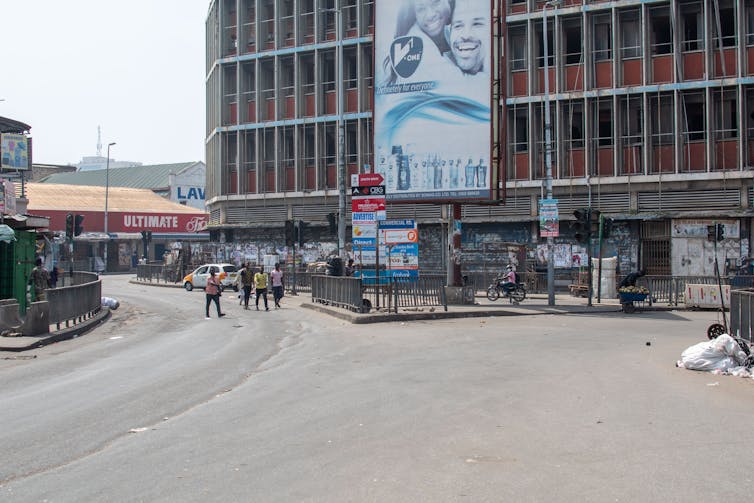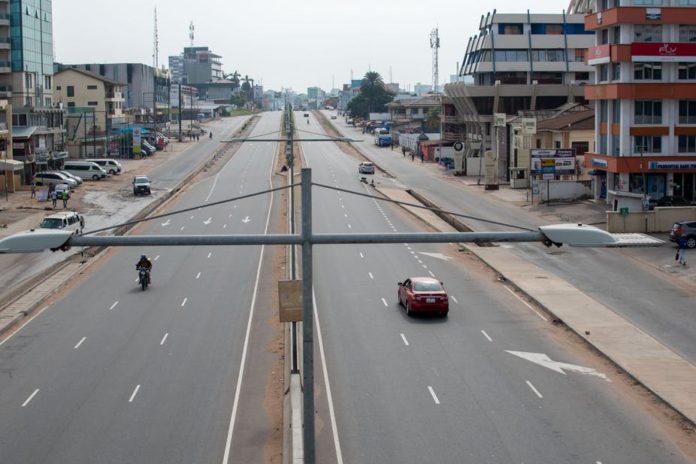Ghana has joined the ranks of countries around the world that are enforcing some form of restriction on movement with the hope of slowing down the spread of SARS-CoV-2 – the virus that causes COVID-19.
The restrictions on movement in Ghana are scheduled to last for two weeks as the Ghana Health Service and Ministry of Health race to catch up with the marauding virus.
This article builds on Ghana’s experience, but its lessons and conclusions shine a light on the challenges ahead for other African nations.
Welcome to social distancing on steroids.
COVID-19 is not as lethal as most of the viral villains that preceded it over the last 40 years. It even discriminates by age and health status, a courtesy which its predecessors like SARS, Ebola and MERS generally did not extend. From available data, the fatality rate generally ranges between 2% and 3%.
So why all the disruption and chaos for a virus that kills two out of every one hundred people? The answer lies in two traits of the novel coronavirus: its infectiousness and its mode of transmission. It’s in the transmission that SARS-CoV-2 excels.
Read more: Coronavirus: how big, how bad, and what to look out for
COVID-19 is caused by a respiratory virus, which means it can spread without direct contact. A cough or sneeze from an infected person close to you is quite enough. And therein lies the challenge.
Why the lockdown?
The ease with which COVID-19 jumps from person to person is staggering. Under normal social conditions, one infected person would infect about three others every three days.
The explosive spread of the virus is such that although its fatality rate is relatively moderate, the sheer number of people who may get infected is astronomical. And with a large enough pool of cases, the worldwide deaths could number in the millions. That level of trauma is simply untenable.
We do not as yet have the benefit of a vaccine or cure – both are probably at least a year away – so we are dependent on social and behavioural change to avert this disaster.
What does this mean in a practical sense?
One way is to focus on individual behavioural change as a means of reducing the likelihood of getting – or passing on – the virus. This is where good hand hygiene and limited face touching come in. But people are people, and old habits die hard.
So the alternative is to reduce the rate of spread by disrupting normal social conditions to reduce opportunities for transmission. To do this, we have to reduce the number of healthy people who come into contact with others infected with the virus. And one of the more drastic measures in this respect is an enforced lockdown, the quarantine of everyone in a given community from everyone else. No contact means no spread.
It is a numbers game
A lockdown is, in essence, a game of averages that goes back to the basic reproduction number of the pandemic. That statistic represents the number of subsequent infections resulting from a single one. For COVID-19 that number is, on average, about 2.26. That statistic is a product of the raw infectiousness of the virus and the number of people an average person in a community comes into contact with on a daily basis.

The first variable in that equation is fixed; the infectiousness of a virus is an immutable feature that is encoded in its biology and ours. It simply does not change unless its genetic coding does.
But the second variable is a reflection of the dynamics of social life in a community. How communal is its culture? How densely populated is its territory? How multigenerational are its households? How young is its population? How much freedom of movement does the society guarantee? How is commerce conducted in its economy?
The answers to those questions determine how often its members come into contact with each other, and each of those contacts is an opportunity to pass on or contract the disease. A lockdown simply reduces how often these contacts happen and, in so doing, how often the virus is transmitted.
A lockdown works by limiting those contacts so dramatically that infected people are rarely in contact with healthy ones. Passing on the virus becomes highly improbable by virtue of the physical distance between them and the minimal overlap in their environments. This is extreme social distancing.
The question, then, is what the specific target level of interpersonal contact should be and how intensive the lockdown must be to attain it. Again, we return to the basic reproduction number. To cripple a pandemic, it must fall below 1.
The average daily contacts in Ghana’s hotspots would need to drop by about two-thirds for the lockdown to be successful. But to actually kill off the pandemic in these hotspots there would have to be no more importation of cases, and the lockdown would have to last a lot longer than just two weeks.
What the lockdown can’t do
The lockdown of the hotspots is one of the sharper weapons in Ghana’s fight against COVID-19. It may flatten the pandemic curve if it lasts long enough. But the lockdown is only a treatment for a pandemic, not a cure.
The lockdown will deal with what comes after it was effected, but it will do absolutely nothing about all the cumulative transmissions of the virus that have occurred before. It will only ensure that fewer people get infected and that new cases appear less frequently, and only while it is still in effect.
All of the infections that occurred before the lockdown, all the policy lapses that allowed them, and all of their consequences – those will still need to be dealt with even after the lockdown is effected.
Ghana will still have to learn the hard lessons about better surveillance, faster testing, and stronger health systems. And we will have to learn them quickly, because the battle is not over. Not just yet.
And the Ghanaian experience offers one final lesson. A lockdown that does not consider the socioeconomic realities of a middle-income African nation amounts to a starvation order for the millions of socially and economically vulnerable people who survive on the daily hustle.
Efforts are under way to address this moral question. But those only emerged as an afterthought, and Ghana is not alone in that omission.
Read more: Why a one-size-fits-all approach to COVID-19 could have lethal consequences
Nana Kofi Quakyi, Adjunct Assistant Professor, Doctoral candidate, New York University
This article is republished from The Conversation under a Creative Commons license. Read the original article.





